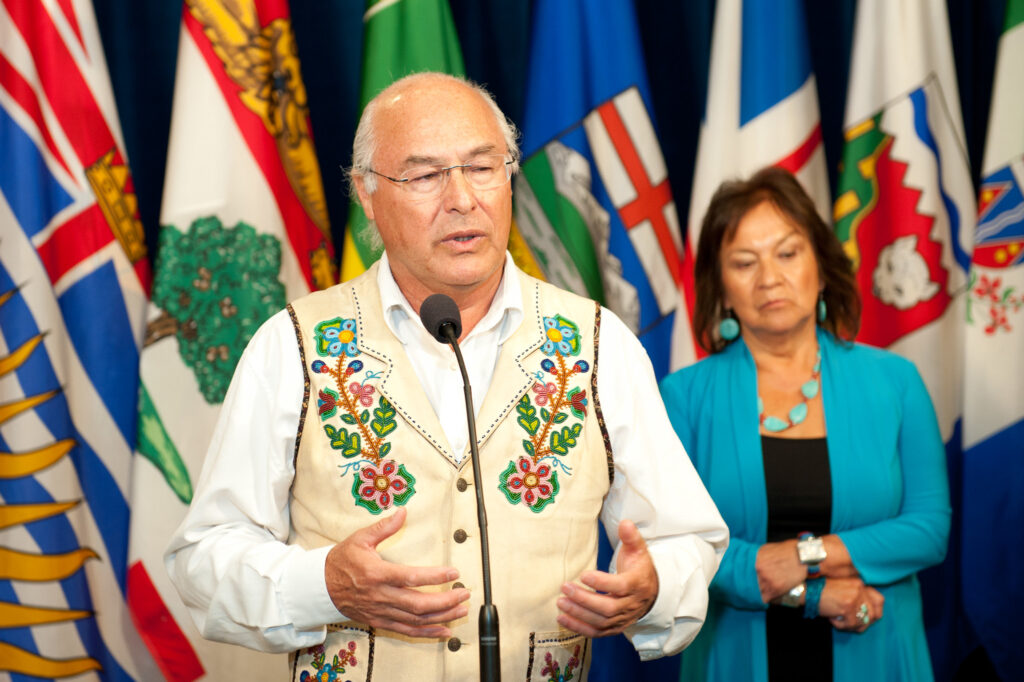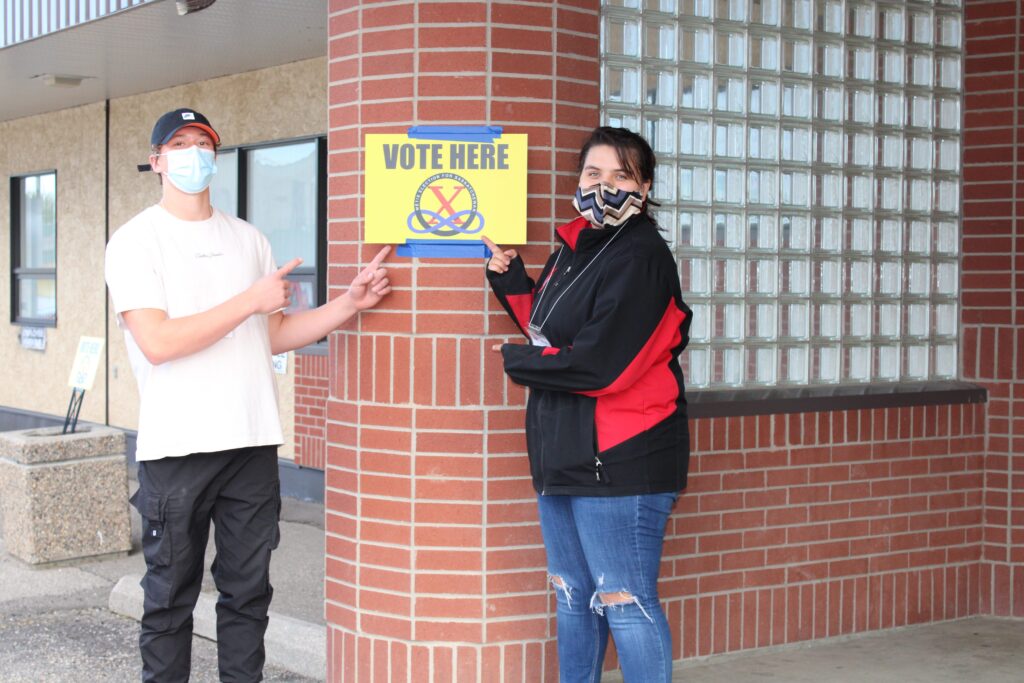
Métis Nation of Saskatchewan’s newly reelected president Glen McCallum says he plans to “hit the ground running” to finish the nation-building project that started four years ago.
The election came down to a vote of confidence in McCallum’s administration that has been working to form the MN-S into a more centralized and structured government. The win gives McCallum a mandate to continue in that direction.
“A lot of things excite me when I think about how we can move the files of our Métis people, and First Nations, forward,” McCallum told the Prince Albert Daily Herald.
“I feel better — I feel a lot lighter knowing that our people believe that there is a better way that we can develop processes and engage with governments. That’s what makes me happy.”
This year’s election was significant because it’s the first time that Métis were required to have a citizenship card in order to vote.
Candidates disagreed on how to move forward after signing agreements with the federal government that brought in more funding.
The direction of the Métis governance system, citizenship, approach to land-claims and consultation policies with industry were hotly debated.
Chartier concedes to McCallum, encourages Métis people to register with nation

Runner-up Clément Chartier, who is also president of the Métis National Council (MNC) challenged the citizenship requirement in court — arguing that a person’s right to vote and receive benefits should be decided by community consensus as it has in the past.
The Court of Queen’s Bench ruled in favour of MN-S. Chartier said the election was ultimately unfair to those who wanted to vote but couldn’t under the new rules.
“There were hundreds of people that were turned away that could not vote… It just was very unfair for people not being able to vote,” Chartier said.
“There should have been at least a phase-in period where people would have had time to sign up for cards. It was unfair in that respect, and it did disenfranchise a lot of people.”
He now says it’s important for as many Métis to sign up as possible so that the next election will include more voters. He hopes that more youth and Elders will get involved in Métis politics.
“I would hope that Métis people in Saskatchewan become more engaged in their government. More and more we’re getting our rights recognized in terms of negotiations — and land could be one of those. But certainly for programs, services and post-COVID recovery,” Chartier said.
“There is going to be substantial amounts of money made available to Indigenous peoples including the Métis nation. It’s important that they’re part of this process and it’s important that they become engaged in the electoral process as well.”
He said signing up will also qualify Métis in Saskatchewan for gains in health and wellness coverage expected to soon come out of negotiations with the federal liberals.
“It would be good to show governments that the Métis in Saskatchewan are serious about their rights. One way of doing that is by registering with the Métis nation of Saskatchewan and supporting it,” Chartier said.
“Regardless of who the president is, support it — because it is our government. Show that the aspirations of the past are still the aspirations today and that we all want to move forward.”
McCallum argues verified registry gives Métis government more legitimacy

McCallum said he’s proud of building a verified registry of citizens, because that builds legitimacy. Previous elections were questionable because anyone could vote by signing a declaration that they are Métis, with no proof, he said.
“This is the first time that we’ve ever legitimized the registry in regards to having a citizenship card to be able to vote. I’m very satisfied with that because the people really believed — and are excited again — to be able to be a part of the Métis nation,” McCallum said.
“Our elections have always been quite in question in regards to self declaration, and buying votes, the list goes on. Those days are gone. They’re done.”
McCallum said election results show his nation-building model is what citizens want. Having a “government to government relationship” with federal and provincial leaders is needed to continue building on gains over the past four years, he said.
McCallum said the MN-S needs constitutional reform and he’s working to get to the point where the province and the courts are less involved in settling its disputes.
“They are not to be giving us direction as to what we should do. We give ourselves direction at our legislative assembly,” McCallum said.
McCallum to continue what he started

Over the next four years McCallum plans to continue in the direction he started four years ago. He said more accountability and transparency from MN-S has already started to pay off.
“Now that we’ve restored Canada’s funding to MN-S we’ve created a self-governing model that we’re following through with. We will continue supporting our locals and build a safe and secure growing citizenship registry — and we’ll keep addressing the issues,” McCallum said.
“I’m so happy to say that… because we’re now accountable, transparent and have a structure in place… the government deals with us directly — government to government, nation to nation. Through this pandemic you can see the results of how we’ve helped out our people.”
He said the healthcare file has shown itself to be a top priority and has been highlighted as important by the pandemic situation. The MN-S launched projects to help citizens on dialysis, with kidney disease or experiencing cancer with mileage and accommodation as well as places to self-isolate for citizens with COVID-19.
“It’s great to see and to be able to not have them looking for support elsewhere but within their government which is the Métis government of Saskatchewan,” McCallum said.
“We are negotiating the health file right now … we’ll be having more conversations. We have some great technical people that are working on our agreement that we will negotiate with the federal government in regard to how we roll out the health plan.”
He said another goal is to build good relationships and agreements between Métis and First Nations as they have done with the Meadow Lake Tribal Council.
“We’ll continue developing that relationship. When the government sees that we’re working together, they’re more likely to help us. That’s exactly what has happened with COVID,” McCallum said.
Building relationships and consulting with the Métis locals is also a priority for McCallum. He wants to stop what he calls a “divide and conquer” approach to the duty to consult with the Métis on resource development by industry and the province.
Chartier has said the province is right to negotiate directly with Métis locals on resource development instead of going through the MN-S. Chartier said he hopes the locals will continue to be involved and have their priorities addressed as a first priority.
He said the MN-S should act in a supporting role for the Métis locals, which are grassroots Métis governments spread around the province.
“MN-S should be there to assist the locals. But it’s the locals who are directly affected, that should be driving the process with the assistance of the MN-S,” Chartier said.
“If the people assign that responsibility to the MN-S due to lack of capacity, that’s fine, too, as long as it’s done with informed consent. That it’s not just taken away from them.
“They’ve been trying for at least the last 15 years to get the locals to assign them that authority and so far, the locals have been refusing. There’s got to be a way to do it but it should be voluntary.”
McCallum argued that communities often lack the resources to negotiate on an equal playing field with the province and industry. Instead, the MN-S should consult with communities and negotiate on their behalf.
“It’s a lot easier when we are able to speak as one voice instead of as one community. So, I would like to have the government respect this structure that we have, and use our structure to engage with the Métis people,” McCallum said.
“We are going to hit the ground running as to how we engage with our people — to be more effective in regard to how industry looks at us and for them to be more respectful in regard to how they impact us. Hopefully, we can get into the signing of agreements where the needs of the communities — and any region — and their concerns are taken seriously.”
McCallum hopes to meet with Premier Scott Moe and Prime Minister Justin Trudeau to get them on board with negotiating through the MN-S.
“If you look at the mining, for instance, we have a lot of mines in northern Saskatchewan, so it would be easy for us to be able to get in touch with Northern Region One, two, or three, and to bring the regional directors and the presidents together,” McCallum said.
“If you look at central Saskatchewan and southern Saskatchewan, then you start looking at the potash mines and other mines that are operating in those areas. So, we’ve got to tap into our regional directors and our local presidents to be able to engage with them.
“In order for the duty to consult and accommodate to be addressed, we need to be able to do a lot of research… That’s how we qualify the Métis footprint in regard to how we engage with our proponents. That’s exactly what we’re going to do, we’re going to be planning that out.”
McCallum conceded there’s more to be done and said he’s grateful for the mandate to continue his work as president. He sees a bright future for Métis in Saskatchewan. Over the past four years the benefits of Métis citizenship have increased and the registry has grown.
McCallum said he’s excited to start “moving these files forward and creating partnerships across Canada and in Saskatchewan to make a better Canada.”
“The reconciliation process has started. We can talk about reconciliation in a very general way, but in a very specific way, it’s the dollars and the capacity that are given to the Métis nation,” McCallum said.
“We should be able to have our students not fall through the cracks and be able to get careers — to be able to own homes and to be happy about being Canadian and being a Métis in Saskatchewan.”

